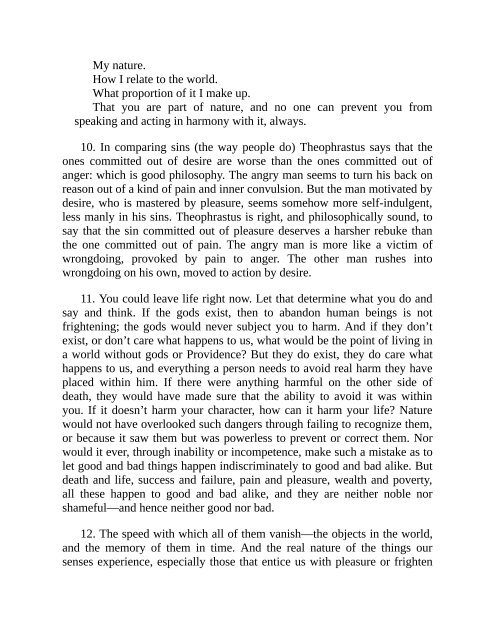9781945186240
You also want an ePaper? Increase the reach of your titles
YUMPU automatically turns print PDFs into web optimized ePapers that Google loves.
My nature.<br />
How I relate to the world.<br />
What proportion of it I make up.<br />
That you are part of nature, and no one can prevent you from<br />
speaking and acting in harmony with it, always.<br />
10. In comparing sins (the way people do) Theophrastus says that the<br />
ones committed out of desire are worse than the ones committed out of<br />
anger: which is good philosophy. The angry man seems to turn his back on<br />
reason out of a kind of pain and inner convulsion. But the man motivated by<br />
desire, who is mastered by pleasure, seems somehow more self-indulgent,<br />
less manly in his sins. Theophrastus is right, and philosophically sound, to<br />
say that the sin committed out of pleasure deserves a harsher rebuke than<br />
the one committed out of pain. The angry man is more like a victim of<br />
wrongdoing, provoked by pain to anger. The other man rushes into<br />
wrongdoing on his own, moved to action by desire.<br />
11. You could leave life right now. Let that determine what you do and<br />
say and think. If the gods exist, then to abandon human beings is not<br />
frightening; the gods would never subject you to harm. And if they don’t<br />
exist, or don’t care what happens to us, what would be the point of living in<br />
a world without gods or Providence? But they do exist, they do care what<br />
happens to us, and everything a person needs to avoid real harm they have<br />
placed within him. If there were anything harmful on the other side of<br />
death, they would have made sure that the ability to avoid it was within<br />
you. If it doesn’t harm your character, how can it harm your life? Nature<br />
would not have overlooked such dangers through failing to recognize them,<br />
or because it saw them but was powerless to prevent or correct them. Nor<br />
would it ever, through inability or incompetence, make such a mistake as to<br />
let good and bad things happen indiscriminately to good and bad alike. But<br />
death and life, success and failure, pain and pleasure, wealth and poverty,<br />
all these happen to good and bad alike, and they are neither noble nor<br />
shameful—and hence neither good nor bad.<br />
12. The speed with which all of them vanish—the objects in the world,<br />
and the memory of them in time. And the real nature of the things our<br />
senses experience, especially those that entice us with pleasure or frighten


